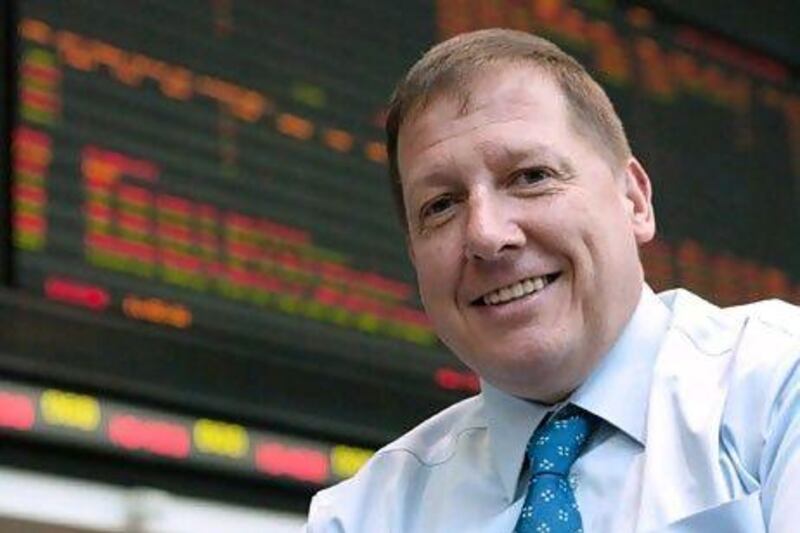It is one of the great ironies of the global energy markets that the Middle East, while being the world's largest producer of oil and gas, has so far failed to cash in on the financial side of the business.
The oil that is pumped ashore from the Arabian Gulf and pours from wells across the region is priced by western financial institutions, and deliveries are largely financed by those same US and European banks.
Once the stuff is out of the ground, it seems, the region wants no more to do with it.
Christopher Fix, the new chief executive of the Dubai Mercantile Exchange, wants to change all that.
"The [region is] relying on foreign expertise in oil finance, and that brings obvious problems. Western banks have their own problems, and many are believed to be considering retreating from the business." He added that the region has to finance its own energy business.
Mr Fix, a former commodity futures trader with BNP Paribas, took up the reins at the DME in August, and has lost little time in recalibrating the exchange's strategy.
Essentially, he has shifted the focus away from the big national oil companies (NOCs) of the region, whose participation in the DME project was previously regarded as pivotal to its success, towards the financial and commercial players in the global energy business.
"Previously, there was too much interest in the NOCs. I can't control what they do, but I can build a better and more efficient platform. When we get that, we'll see if the NOCs want to come on board."
The DME was launched in 2007 as an attempt to bring more of the Middle East's oil business under regional control.
Price-setting and benchmarking of oil had for years been the exclusive prerogative of western traders and financiers, notably in the two best-known types of crude, West Texas Intermediate (WTI) and Brent.
The DME hoped to replace these two benchmarks with the local variety, Oman crude (which also includes the type produced by the Dubai fields), and to make the new benchmark the standard for trading in the Middle East and Asia.
Mr Fix has no illusions as to the hurdles that the DME faces.
"Brent and WTI are both part of an ecosystem that grew up over a long period. WTI had its power base in Houston, Texas and in the Gulf of Mexico. Brent had the North Sea and the big refineries of Europe and the London financial centre. We are looking to be the hub of the new Middle East ecosystem," he says.
It has been slow work. In 2008, the first full year of operation, some 322 million barrels of crude were traded on the DME, a modest amount compared with the billions of barrels of WTI and Brent.
But there has been considerable progress. In March, the DME passed the milestone of three billion barrels traded. Setting a new benchmark, and pricing it efficiently, is a more complicated process. Price is determined by taking a snapshot of trading volumes over a fixed settlement period, and the recent figures show volumes are increasing.
In terms of contracts to trade oil (the DME's normal yardstick, with a contract comprising 1,000 barrels), the settlement period last month was a record, with 37,617 contracts traded, a 54 per cent rise over the previous month and 12 per cent better than the record previously set in April last year.
"It was a record month. I think we can say for sure we have a successful contract," says Mr Fix. However, that is not the same as setting a new benchmark. Some industry analysts believe the DME cannot successfully dominate oil trading in the Middle East without the participation of Saudi Arabia, the leading regional producer, and so far the country has decided to stay out of the DME.
"I cannot speak for them, but I know they have their own priorities and their own national institutions to consider," says Mr Fix.
So how does he propose to take the DME to the next level? For one, he intends to get local banks more involved in the business of oil finance.
"I'm talking to six local banks to encourage them to develop their energy finance activities. They are working on it, taking talent away from some of the western institutions. It involves a lot of work in developing internal regulatory and clearing systems," he explains. The other strand of the strategy is to do more deals like the one with the giant Indian conglomerate, Reliance Industries, which became a member of the DME earlier this year.
"It's the first major Indian company to have joined any global oil futures market, and we hope it will lead to others."
He is also planning trips farther east, to Singapore and China, to drum up more business and generate membership in Asia.
"The global energy business is desperate for a new benchmark. The two that dominate now just do not reflect the realities of eastern trade flows."
[ fkane@thenational.ae ]





